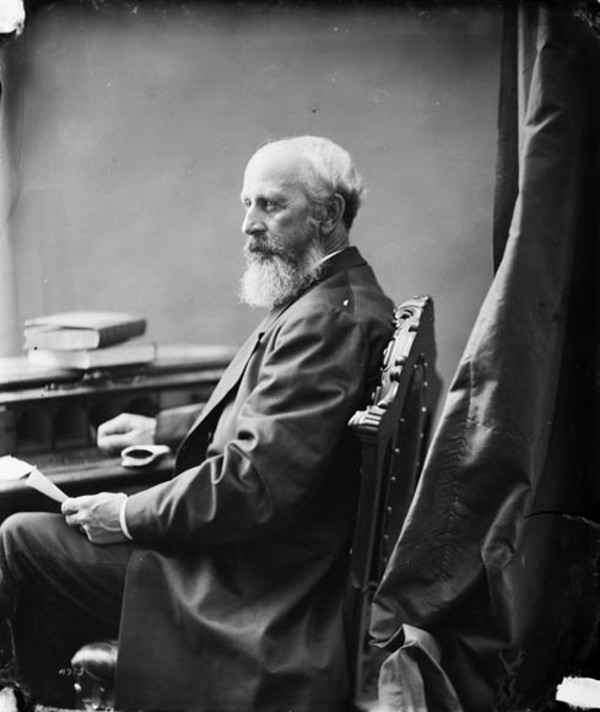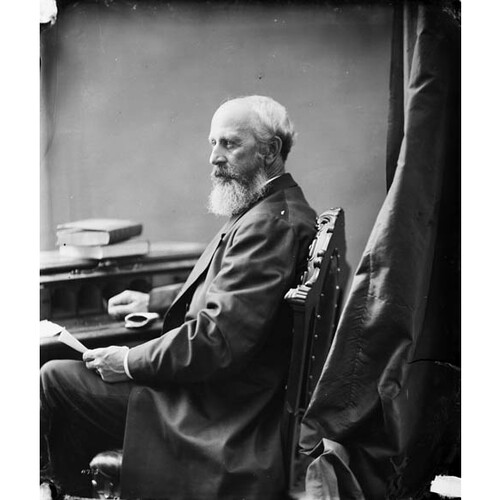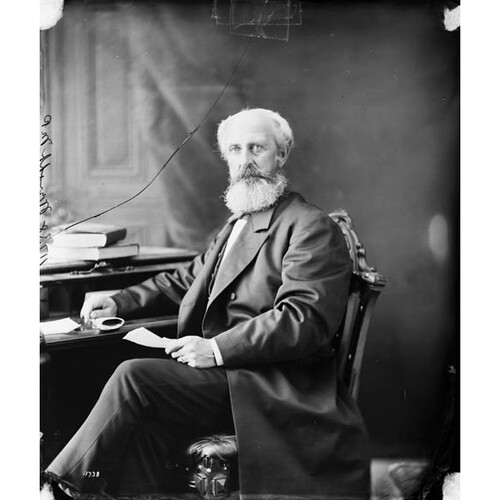As part of the funding agreement between the Dictionary of Canadian Biography and the Canadian Museum of History, we invite readers to take part in a short survey.
WRIGHT, AMOS, politician and public servant; b. 24 Nov. 1809 in Leeds County, Upper Canada, near the present village of Mallorytown, son of Abraham Wright, uel; m. in 1833 Maria Raymond, and they had at least three children; d. 31 May 1886 at Port Arthur (now part of Thunder Bay), Ont.
As a child Amos Wright moved with his family to Richmond Hill in York County and his education does not seem to have continued after the move. It was in Richmond Hill that he became established as a farmer and mill-owner, and he was elected reeve of Markham Township in 1850. One year later he was elected to the assembly from the riding of York East, defeating Edward William Thomson*. At first he supported the Reform ministry of Francis Hincks and Augustin-Norbert Morin*. Like Joseph Hartman* of York North and David Christie* of Wentworth, he moved into a more radical position than the ministry; this trend is discernible in the journals of the fourth parliament although his voting record was by no means consistent. The voters of York East returned him in the election of 1854, against a moderate Reform opponent, John Sheridan Hogan*, but the ambiguity of his stand on crucial issues brought denunciation from both the Clear Grit and the Conservative press. The Toronto Daily Patriot and Express declared that he “was so flattered and fondled by great men in high offices that he looked as bewildered with unexpected honors as an interesting widow giving herself away in matrimony for the fourth time.”
For the decade following 1854, Wright was a consistent supporter of George Brown* and the Clear Grit party on issues of wide significance such as representation by population. However, his rare interventions in debate and the few resolutions he supported reveal the narrowness of interest in a rural constituency of his time. As a supporter of confederation, he followed Brown into the coalition of 1864, but he did not rejoin the opposition when Brown resigned from the ministry in the following year. The ferment among Upper Canadian Reform groups in 1866 temporarily recreated some of the pressures that Wright had successfully weathered a decade earlier and, in selecting a candidate for the first dominion parliament, the Reformers of York East chose a different standard-bearer, James Metcalfe.
Wright’s absence from parliament proved to be a brief one. A vacancy was created in York West by the resignation of William Pearce Howland*, the newly appointed lieutenant governor of Ontario, and Wright successfully contested the federal by-election of 1868. He chose to retire from politics before the election in 1872. In 1875 with Liberal governments in Toronto and Ottawa he received appointments from both: in April he became the federal Indian agent and in May the province’s crown land agent for the Thunder Bay area.
With the Conservatives in power federally after 1878, criticism of Wright’s work increased, but the dispute which brought about his dismissal arose from more than political differences. Simon James Dawson*, the local mp, had strong views on local patronage and on northern development. As a Catholic he urged the appointment of Catholic Indian agents to please Bishop Jean-François Jamot, in whose diocese northwestern Ontario lay, whereas Wright, a Methodist, praised Methodist missionary efforts among the Indians. The political and religious tensions were brought to a head by a case involving a conflict of interest. Wright purchased, from Binessie (Pinessie), the chief of the Fort William Indian band, part of the property the band had recently acquired from the Ontario Crown Lands Department. The chief later complained to the federal authorities that Wright had brought undue pressure to bear upon him and that the price he had agreed to accept was well below current land values. Although the transaction was allowed to stand, the federal government was provided with an opportunity to change personnel without changing policy. It was argued that “Mr. Wright’s conduct in this matter has to say the least materially impaired his usefulness” and, over some protest from local Liberals, a new Indian agent was appointed in 1883.
Wright continued in his provincial appointment until his death three years later. The preponderance of free grant applications from Markham Township may reflect the land agent’s continuing link with the area in which his family still resided. Wright also held several other posts during his life. He was a member of the senate of Victoria College in Cobourg, an associate judge for York County, chairman of the board of the grammar school commissioners in Richmond Hill, and president of both the mechanics’ institute and the agricultural society in Thunder Bay.
Despite his record of “usefulness and social popularity,” Amos Wright remained a minor actor in the political drama in Canada in the mid 19th century. His career reveals both the predicament of the so-called “loose fish” in an era when party organization was strengthening, and the powerful but limited interests of the loyalist, Methodist, and rural society he represented for so long; it also throws light upon the political reward system of the 1870s when a young and developing north was considered an appropriate area for the appointment of ageing party men for whom no Senate seat was contemplated.
AO, MU 3154. PAC, MG 26, A, 289; 293; RG 10, 132, 1081; 1083; 1090. Can., Prov. of, Legislative Assembly, Journals, 1852–66. Globe, 12, 22 March 1853. Toronto Daily Patriot and Express, 23 Feb., 18 March 1853. CPC, 1862–72. Cornell, Alignment of political groups.
Cite This Article
Elizabeth Arthur, “WRIGHT, AMOS,” in Dictionary of Canadian Biography, vol. 11, University of Toronto/Université Laval, 2003–, accessed March 28, 2025, https://www.biographi.ca/en/bio/wright_amos_11E.html.
The citation above shows the format for footnotes and endnotes according to the Chicago manual of style (16th edition). Information to be used in other citation formats:
| Permalink: | https://www.biographi.ca/en/bio/wright_amos_11E.html |
| Author of Article: | Elizabeth Arthur |
| Title of Article: | WRIGHT, AMOS |
| Publication Name: | Dictionary of Canadian Biography, vol. 11 |
| Publisher: | University of Toronto/Université Laval |
| Year of revision: | 1982 |
| Access Date: | March 28, 2025 |





